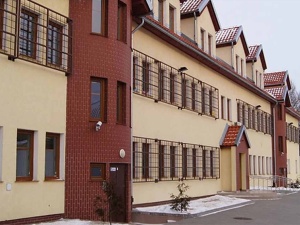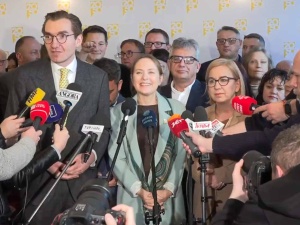The joint European response to labours problems - interview with Tea Jarc [ETUC]
First of all, please explain what the Youth Committee of the European Trade Union Confederation is and what it does?
- The ETUC Youth Committee represents young workers within the ETUC and influences the work of the ETUC, ensuring the youth voice is being heard and taken into the account.
One side we influence different European policies by addressing different topics related to the transition from education to the labour market and a specific situation young workers face.
On the other side we empower young people within trade unions. The Youth Committee is a leading force behind the strategies to attract young people to the trade unions and to strengthen the position of young people within the existing trade union structure.
The Committee is led by an elected Bureau that develops programs to empower young workers and trade union representatives by organizing training, seminars conferences, study sessions and campaigns for young workers around Europe.
It is an amazing place where young trade unionists can get familiar with trade union work at the international level, contribute to policy making and at the same time learn from each other and from practices from different countries.
Until June this year, you were the President of the Committee. What has been achieved during your term of office?
- I had a huge privilege to work as a president of ETUC Youth Committee since December 2019. But I must admit, my mandate was done in a very specific situation, because just couple of months after I started, the pandemic hit us and everything changed. We had to adjust to new circumstances and I am happy to say that the youth committee responded fast and effectively. Most of the things happened online, but nevertheless, we had quite some many milestones.
In advocacy point of view, we kept it busy. After the negotiations with the social partners and the European Commission, a framework for Reinforced Youth Guarantee was adopted and we developed quality standards for the Youth Guarantee offers.
We did a research among our members on the impact of the pandemic on young workers and we developed policy proposals on Youth recovery.
We advocated for European Pillar of Social Rights and we presented how it should look like though youth lenses.
And this year, in the European year of youth, we developed a campaign to Ban unpaid internships across Europe and ensure decent working conditions for all young people in Europe.
But one of the main priorities were also connected to strengthen the youth voice in trade unions. In order to empower youth trade union structures and support our affiliates in their work, we have produced a GUIDE ON: ENGAGING YOUNG MEMBERS IN THE TRADE UNIONS and print it in 17 thousand copies that were shipped across Europe. It is available in 14 languages: Bulgarian, Croatian, German, English, French, Italian, Latvian, Norwegian, Polish, Portuguese, Romanian, Slovak, Slovenian, Spanish and Turkish. To support the recruitment of young people, we developed seven short videos that target young workers who are not members of the trade unions (yet!). The videos that bust the most common myths or explain the rights of workers in nutshell are available in ENGLISH, FRENCH, HUNGARIAN, POLISH, MACEDONIAN, BULGARIAN, SLOVAK, ITALIAN, SPANISH and LATVIAN.
And of course, with your help, we adopted the Youth Quota. With this we are one step closer to a fair representation of young people at ETUC congress. At the Mid-term conference in Lisbon 2021, our constitutional amendment was adopted by 71,61% in favour. It calls for all organisations to include members younger than or aged 35 and says that every fourth delegate per delegation must be younger than or aged of 35, otherwise its voting rights should be reduced proportionally.
The list of achievements is actually much longer. Only when finishing our mandate, I realised how much we did and it is clear the pandemic didn’t stop or limit us. We worked with the same, or even bigger passion, committed to make a difference.
Are European youth struggling with any common employment problems, regardless of the country in which they live and work?
- The commonalities are seen in most of the European countries and they are reflected in high youth unemployment and precarious, unstable working conditions, often leaving young people without any safety net.
The race to the bottom and the liberalisation of the market led to an increase in young people who had little choice but to accept unfair working conditions in the form of temporary contracts, 0 hours contracts, bogus self-employment, unpaid or poorly paid internships that often-substituted entry-level jobs.
We, at ETUC Youth have been warning for a long time that the austerity measures introduced after the last economic crisis, left the labour market a very hostile place for young workers.
Unfortunately, this is seen in most of the European countries, therefore it also makes sense to have a joint and European respond to it.
Is there a difference between the situation of young people in the labor market in Western Europe and Central and Eastern Europe?
- The trends of flexibilization of labour market are spreading all across Europe and the world. There are of course still differences when it comes to different regions. This can be easily seen when looking at youth unemployment rate. In spring 2022, the youth unemployment rate in EU was 13.6 %, but with big differences among the countries. For example, in Greece it was 36.8%, in Spain 28.9% and Italy 23,8%, while in Germany it was 5,7%, in Czechia 7,9% and in Poland 8,9%. This data clearly shows us there are big differences mostly between the south and the rest of Europe.
In Poland, a big problem of young people is the lack of stable employment conditions, and thus the inability to buy a flat or start a family. How is it in the rest of Europe?
- Exactly the same. Due to their precarious and unstable situation at the labour market, young people are facing difficulties in their transition to an adulthood. They cannot get independent, they cannot move out form their partners house, they can’t start their own family or plan their future. Their situation of dependency is being prolonged.
Even if they are participating at the labour market, their low wages do not allow them to resolve other aspects of their life, such as solving their housing issues. Either they can’t pay the high apartments rents or they don’t get a loan from the bank.
The situation at the labour market impacts all other spheres of ones live. What is even more worrying is the health of young people, especially mental health. Recent researches show that precarity has a very negative impact on wellbeing of young people, many of them facing high amount of stress and falling into a depression and low self-esteem. More and more trade unions are addressing this topic as well, tying to help their members. And as much as this is needed and appreciated, we must not forget, that this is a consequence of structural problems and the broken system we live it. The system, that doesn’t work for the people, but it exploits them.
A new trend on the labor market is the so-called "Uberization of employment". A system in which the employer avoids hiring people thanks to the application acting as an intermediary. How do you rate it?
- Platform economy is getting wide spread in the EU and in 2020 it was estimated to be as high as €20 billion. In the EU alone, there are more than 500 digital labour platforms and more than 28 million platform workers. Most of those workers are enrolled as self-employed and for most this means that they have no or limited access to labour and social protection, such as collective bargaining rights, health and safety protection, and no or limited access to social protection schemes and safety nets. Their income is often unpredictable and determined by algorithms, which means workers have no control over that.
Platforms want to portrait themselves as innovative, technological corporations, hoping with this they will be able to avoid responsibilities that other employers have. But, as we clearly saw in the least reveals of Uber Files leak, they are going around existing laws and are spending millions for anti-worker lobbing. They do not create new jobs, but they are increasing precarious work, many of them avoid paying fair taxes and they simply make their profits on exploiting workers.
This has to stop. It is time to regulate platform and ensure fair platform work. This is why ETUC has been actively advocating for adopting a strong EU directive to improve the working conditions in platform work and in December last year European commission published their proposal for a directive. Now it is up to the Member states to strengthen it, safeguard the decent working standards and make platforms accountable.
I bet you have something to say about global corporations. Should they be under greater state control, or should they be allowed to develop freely to meet consumer needs?
- Definitely under greater state control. Right now, we live in a world, where it looks like corporations have even more rights than the citizens. Too many of them exploit workers, ignoring the workers’ rights, they exploit the environment and with their lobbying they are buying their way to decision making power as well.
In a global world, of course there will also be global corporations and a free trade. But this should not mean the world have to spin in a way they wish. The system should primary work for the interest and wellbeing of the citizens and the environment, not for serving the capital. Properly regulated corporations can contribute to growth and create jobs. This also mean they would need to pay fair share of taxes.
I believe corporations can respect their obligations and at the same time meet consumers needs. We, as consumers should demand this from them. We have to become more critical and aware of the independence of each other’s. As much as some services and produces are convenient or us, they might be produced by child labour, in sweatshops or by causing irreparable damages to environment. And although this might be happening out of our sights, on other parts of the world, it is still happening. And is happening also because of us, to product the products we use. But we cannot simply settle for that and accept it as something normal and acceptable. Workers all around the world should show more solidarity for each other’s, come together, united and demand decent working conditions for all. This would also force the global corporations to change their practices and comply with higher standards.
Recently, a discussion on shortening working time has started in Poland. In Europe, this topic is also discussed frequently. Can we afford more slack in times of the pandemic crisis and the war in Ukraine?
- Exactly now, after the pandemic we need to have a broader reflection of realise, we cannot go back to business as usual. The pandemic releveled how the current systemin crisis leaves too many people behind and how inequalities are getting bigger and bigger. Although the pandemic was a crisis for billions and billions of people, it allowed the privileged ones, the few, to gain from this crisis. The rich people, the billionaires, got even richer and they profited from this crisis.
In general, looking from global perspective, we have more wealth than ever. We procure things faster, more efficiently, with less expenses. The problem is the fact that the wealth is not being distributed equally and the workers who are the one producing this wealth do not receive their fair share. This could be done also with reducing working hours. Robotization and automatization should also lead to that and technology should make our lives easier. All of this is possible. But it would require a systematic change that would ensure taxation of the rich, investment in public services and a fair redistribution. Today there is definitely no need for work 40hours and more per week and there are more benefits of reducing working hours. It is proven that this even increase productivity and economy, and of course it has positive impact on health and safety, on wellbeing of workers and of course on the environment; especially if we switch to 4-day working week and there would be less transport.
It took centuries to achieve 8-hour work day which became more standardise in 1866. And this was all done due to a strong labour movement. Since 1866 we have evolved and developed; as society, and as industry. I think it is about time to reduce working hours and this should definitely be one of our strongest trade union demands for the future.
War in Ukraine should not become something acceptable, a new normality. We should put all focus on ensuring peace immediately. As long as we have such devastating circumstances of course it is hard to think of more progressive ideas. But if we do not learn from the crises and change things on broader level, new crisis and conflicts will accrue again and again.
How is NSZZ Solidarność perceived by trade unionists in Europe?
- I am very happy to see NSZZ Solidarność active also in youth related topic and investing in strengthening the youth trade union structures. NSZZ Solidarność just recently joined ETUC project “Time for quality jobs” on youth unemployment, where with case countries we will build concrete policy proposals and campaigns to address youth unemployment. Moreover, this project allows ETUC to directly support its affiliates in their work at the national level. We will even allocate funding for the organisations involved, so they can really develop the measures needed and that are tailor-made for their national realities.
NSZZ Solidarność of course is a very important organisation within ETUC. Not only because of its historical value, but because of its role of today. It is one of the biggest trade union organisations in Eastern Europe and with this representing an important number of the workers.
Especially today, because of the war in Ukraine, NSZZ Solidarność presents an important partner in helping Ukrainian people and workers.
What are your plans for the near future in your trade union activities?
- I have been involved in trade unions for 8 years. In Slovenia I’m a president of our trade union called Sindikat Mladi plus, which is a trade union of pupils, students, young unemployed people and precarious workers. The main priority right now is to help platform workers, and we are in the process of organising delivery riders in trade unions and represent their interests. I believe it is important for the trade unions to reach out to all categories of workers, organise them and empower them and with this also showcase that trade unions are relevant structures for them as well. Only as organised, collectively and with solidarity, we can improve conditions for all. Therefore, my main priority is focusing on organising, developing new trade union approaches and modernisation of trade unions.
On advocacy level I am involved mostly on topic of future of work, non-standard forms of employment and economic systems.
Our trade union is part of the biggest trade union confederation in Slovenia, ZSSS, where we are also getting ready for our Congress which will happen in October. This means that some new opportunities will open for me especially regarding the work for confederal level.
But I must also admit that being a president of ETUC Youth committee for the past 2,5 year was an amazing and inspiring experience. And moreover, it allowed me to see the functioning of the whole ETUC, also from the inside, and what it’s potential is. I am at the same time still involved in the ETUC Women’s committee. These experiences motivate me in contributing to trade union development at the international level, so I will also look for opportunities how to do that also in the future.
I believe ETUC has a huge potential, that it needs some fresh ideas and approaches and if there would be a possibility and a shared vision on how to achieve it, I’d be happy to be a part of its future.














